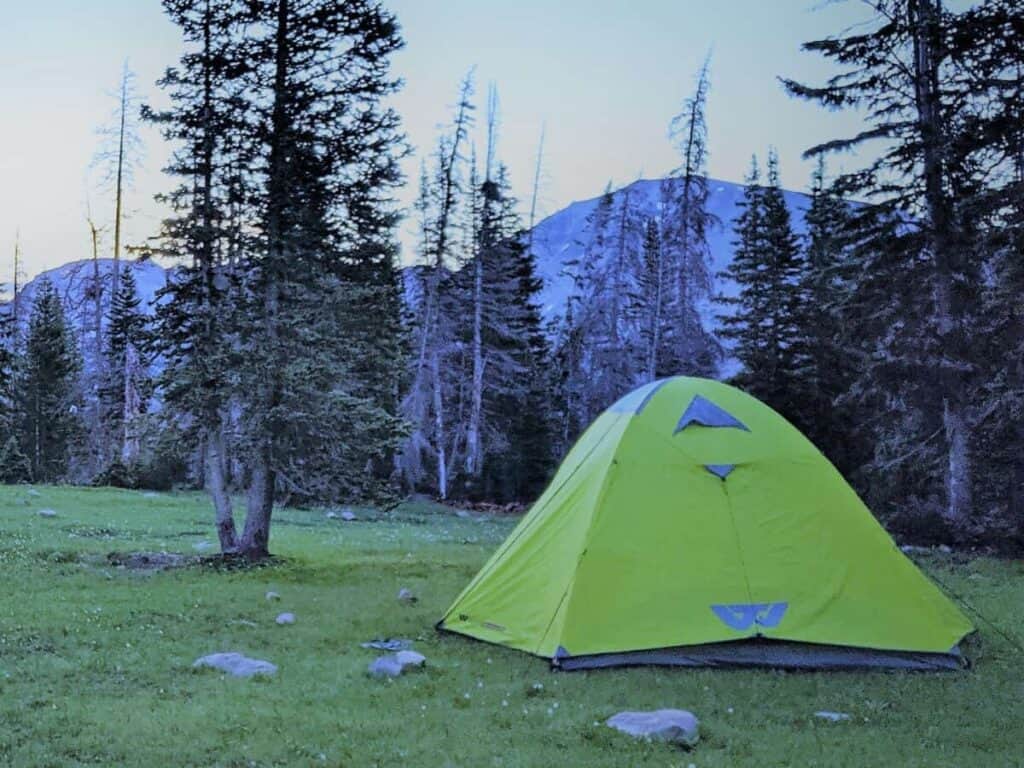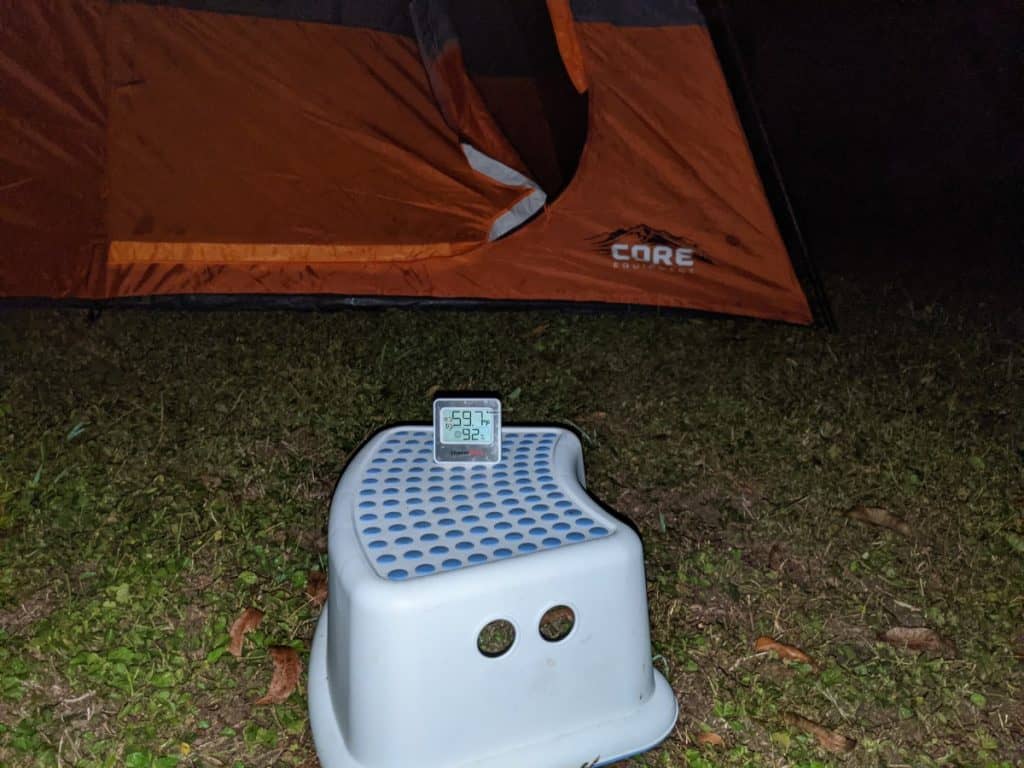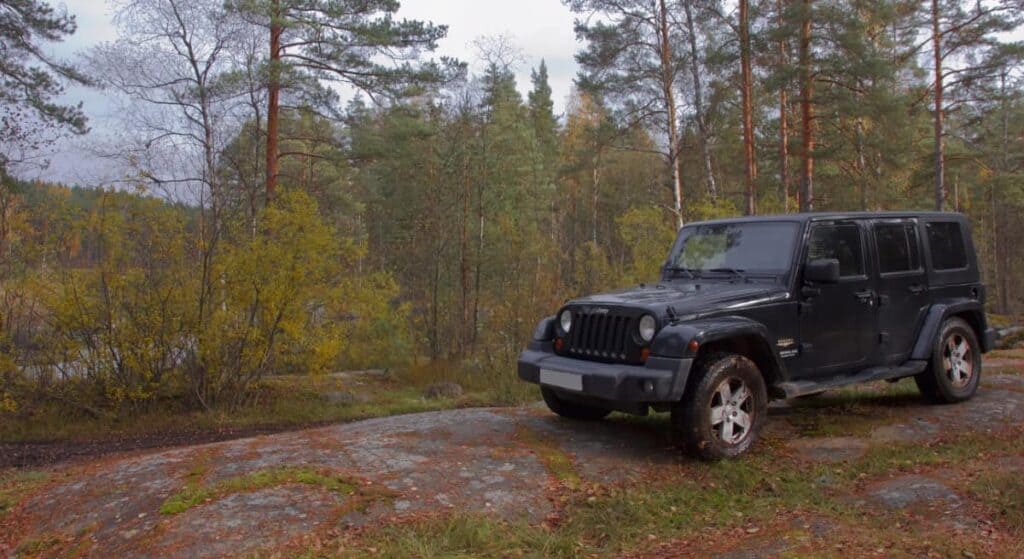That tent has really thin walls, can it really make a difference in temperature? Will a tent be able to protect you from the cold?

In any climate, it’s going to be warmer inside your tent than outside of it. Most tents are designed to keep the wind out and heat in. Consequently, the inside of a tent can be at least 5 degrees warmer than the outside.
Still not sure that a tent can keep you warm? Continue on and you’ll learn about just how much warmer a tent can be than the outside, what factors can affect the temperature in a tent, and how sleeping in a tent compares to sleeping in a car.
By the way, as an Amazon Associate, I earn when buying qualified products through links on my site.
Do Tents Keep You Warm?
Because a tent blocks wind and traps air, it will always feel warmer inside a tent than outside. However, in some cases, such as in cold conditions and in bigger tents, the inside of a tent can feel only slightly warmer than outside the tent. I did some tests below–check it out for more details.
When you look at just about any survival guide, you’re going to find that two of the top priorities for survival include shelter and clean water. The latter makes sense, as humans can dehydrate quickly if we don’t have access to water that is drinkable. Dehydration can become even worse if we end up drinking water that makes us sick.
However, you might find yourself wondering what makes shelter so important. Well, if you’re lost in the wilderness, exposure to the elements can be a dangerous thing. It can make us more susceptible to illness, heatstroke, hypothermia, and more. Consequently, even the simplest of shelters can improve our comfort level and ability to survive.
Something that many tents do to aid in that comfort is trap heat inside. Instead of letting your heat out into the air, tent materials are designed to keep the heat inside with you. That can include both your own heat and the heat from any sunlight on the tent.
While most of us may be enjoying a few days in a campsite or backpacking through the woods rather than stuck in an intense survival situation, that warmth is still important for comfort.
Another key factor worth considering is how well your tent can keep water out. No matter what temperature it is in the tent, it’s going to be miserable if water leaks into your camping home. Our article on waterproof tents can help you to find a tent that will keep you dry. Check it out here.
How Much Warmer Is It Inside Your Tent?
The temperature in your tent can vary pretty widely when compared to the temperature outside. The weather you’re camping in, the size and kind of tent you have, and how much airflow it has, can all play a role in how hot it gets inside.
For example, In ~60 degree weather at night with one person in a 6-person tent, the inside of a tent will be about 1.25 degrees warmer than outside.

Most of the time, assuming you aren’t camping in direct sunlight and under high temperatures, your tent can be about 5 to 10 degrees warmer than the outdoors. That said, this number can easily jump up if the weather conditions allow the tent to absorb more heat. If you’re in direct sunlight, your tent acts like a solar oven. (did you know you can use a solar oven to cook with while camping? Super cool, right? Learn more about them at our toast article here.
Those of you who have camped in hot weather are likely familiar with the feeling of stepping into a greenhouse when you need to get something from your tent on a hot afternoon. In these cases, you may find your tent can even be 20 degrees warmer than the outside.
Things That Affect Tent Warmth
It cannot always be guaranteed that your tent will be warm enough by itself without the addition of warmer clothes and blankets. There are a few factors that can play a role in how warm your tent is able to get.
The following are important factors to consider when you’re considering how warm your tent might be on a given trip.
Climate and Weather
Naturally, the weather you’re camping in plays a huge role in how much warmer your tent is than the outside. Those who have camped in higher temperatures have likely discovered this for themselves. Tents can seem to act similarly to greenhouses. They get a bit of sun and the inside really heats up.
On the other hand, you won’t feel that way camping while it’s colder. Tents will still be warmer than the outside, but the temperature difference will be less. If it’s going to be cold and dry, it helps to avoid the shade rather than seek it if it’s cold outside. That way, the tent can soak up any sun it is able to get to keep you warm.
Available Shade
A large factor in the warmth of your tent relies on sunlight. Consequently, you’ll want to consider the amount of shade you aim for when selecting a place for your tent. More shade is going to mean a cooler tent, while less shade allows it to be a bit warmer in most circumstances.
That said, if you’re camping in constant rain, snow, and otherwise sunless, cold weather, don’t expect a warm tent even if it’s not placed under any shade. On the other hand, shaded tents can still get quite warm in hot weather, but shade can help to keep it from becoming an oven.
You might also want to think about when you might want your tent to be warmer. Many of us are aware that shade tends to move throughout the day as the sun moves through the sky. If you’re staying in an area with hot days and cold nights, you may want your tent to be able to soak up sun later in the day so that it can keep you warmer at night.
This oven effect doesn’t last for super long, but it may make at least for a more comfortable bedtime routine.
Tent Design
The kind of tent you have can definitely determine how much heat it’s able to absorb and contain. Tents that are made for colder temperatures, such as 4-season tents like the Arctic Oven are designed for absolutely frigid temperatures. Consequently, the design strives to keep as much heat inside the tent as possible. This makes it an excellent tent for the colder seasons, but really not ideal for high-temperature summer camping.
These cold-weather tents seek to limit airflow to only what is necessary. They often include reinforced seams and avoid too many windows and doors. That way, they can limit the heat that is able to escape the tent.
If you prefer to camp in the heat, it’s wise to look for a tent with plenty of airflow. That will make it easier to cool the tent down when you need to. However, be careful not to let too much escape if you know the outside temperature is going to drop overnight!
Larger tents get colder than smaller tents.
I’ve found this out from my own experience. The larger the tent, the more air, the more your body heat will disperse in the tent. Smaller tents keep the heat in better.
The Number Of People Using The Tent
As you might expect, more bodies in the tent will result in more warmth. As long as you don’t have a door or window open, most of that heat will remain trapped inside. This can be both good and bad, depending on the weather and exactly how much heat is being created.
If it’s cold out, the extra body heat can be a blessing. Everyone will be able to sleep more comfortably, even without the need for a mountain of blankets or electricity.
However, in particularly hot or humid weather, extra body heat can become a burden. It can make the inside of the tent more humid, sweaty, and uncomfortable.
In this case, it’s always better to have a tent that has a “sleeps” rating that is 2 people higher than the size of your group. For example, if you have a group of 4, you should look for a six man tent (at least).
Can A Tent Be Enough To Keep You Warm?
It is possible that a tent can be all you need to sleep comfortably, but it’s not something you should expect. Even if you’re camping somewhere that remains warm through the night, you never know when there might be a storm or other sudden weather change that could leave you shivering.
Always pack along at least a few extra blankets and warm clothes, just in case. You don’t have to load up your pack with additional items for warmth if you know the chances are good you won’t need them, but it’s better to have a few things and not need them than to end up freezing all night long.
On those nights when the tent alone isn’t enough, some may opt to use a portable heater. How do you know which heaters are safe to use in your tent? Out article on the subject can provide all the information you need to be comfortable and safe. Take a look here!
Is It Warmer To Sleep In A Car Or A Tent?
Some may think that if the thin walls of a tent can add a few degrees of heat, the thicker walls of a car should be able to provide even more. After all, cars are more solid and made from more durable materials.

There are reasons you may want to opt for sleeping in a car rather than a tent. If you’re afraid of wild animals, there’s definitely a good chance you’ll feel safer sleeping inside metal walls.
In most cases, it may be the case that a car can provide more protection from animals. However, that may not apply to all animals. In our article here, learn about how to keep yourself (and your car windows) safe from bears.
Heat isn’t something that a car can provide easily. Unless you opt to run the car heater throughout the night, which isn’t generally a great idea, a tent is going to do a better job of trapping heat.
Cars are made using various metals, which can easily become very cold if the weather is cooler. Additionally, vehicles don’t provide the ability to contain warm air that tents do. Vehicles aren’t typically designed with the desire to avoid airflow.
That’s my own guess at why cars don’t retain heat–but from my experience it’s absolutely true. Cars really don’t hold heat in very well and it can get very cold. If you are sleeping in your car and want to learn how to stay warm, check out our detailed article here.
On the other hand, tents keep your own heat locked in without the risk of running your battery dead. So if you’re looking for the ideal spot to stay warm, you’ll have better luck in a tent than in a car.
